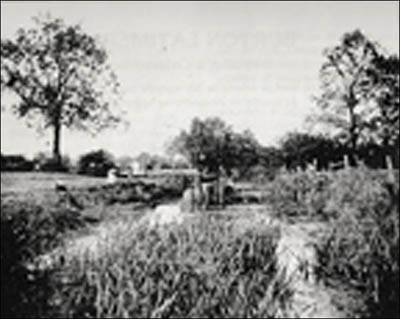Extract from Northampton Mercury Saturday 8 April 1865 |
|||
|
|||
 |
|||
John Glover, master builder, of that village, was charged with stealing a quantity of oziers, on the 14th ultimo, vlaue 6s., the property of John Smith, basket maker of Kettering. Mr Murphy appeared for the prosecution, and Mr Haxby of Leicester, conducted the defence. Prosecutor is a basket maker, residing at Kettering, and rents an ozier bed of Mr Everitt, in Burton Latimer parish. He had on several occasions missed oziers from the bed. He produced a letter brought to him by a child, specifying that Glover had got some oziers belonging to him. Charles Smith, son of John Smith, was at the ozier bed on Thursday, the 9th of March, making preparations for planting. No oziers were out at that time. Visited the bed again on the 14th, and observed that the plants he had previously seen uncut had been cut from them. He went to Isham, and thence to a field where Thomas Mason and another man, whose name he did not know, were at work, tying up faggots with ozier bands. The men told him they were at work for Mr. Glover. Two tied up bundles of oziers lay on the ground. He told the men that the oziers were stolen property, took possession of them, and put them in care of Mrs Issitt, at Mr Gawthrope's lodge, in Barton Seagrave parish, who locked them up in a barn contiguous to the cottage. On the following morning he went to Burton Latimer, and had an interview with Mr Glover. He asked him where he had the oziers from, when he replied, “I bought them of a man named Walpole, of Denford.” On Friday morning he went and fetched away the oziers from Issitt's lodge, took them to the Kettering police station, and gave them in charge of the inspector. Cross examined: There was a wood sale about, and faggotting was being sold, and he attended with a view of discovering whether the oziers in question had been used as bandages. Cut a few oziers from the bed, and found them to correspond with those produced. Elisha Sowell, police constable, accompanied Charles Smith to Burton, on the 15th of March. Saw Mr Glover, and heard him say he bought the oziers of Mr Walpole, of Denford. Thomas Mason said on Tuesday, March the 14th, he was at work in the field for Mr Glover. Remembered young Smith coming and seizing some oziers. Mr Glover and his men brought the oziers to the field on a draft. Cross examination: It was by no means uncommon for persons to go about to sell oziers for bandages. Edward Craythorn, inspector of police, saw Glover, who said he bought the oziers of Walpole, of Denford. Went to Denford, a small village near Thrapston, and made enquiry, and found no person of that name. George Groom said he had lived at Denford fourteen years, and no person bearing the name of Walpole had during that period lived in the village. William Everitt said his father let an ozier bed to prosecutor. Glover came to him on Wednesday, the 15th, and asked him if he had any ozier bands to sell. Told him no, he had not any to dispose of, as his father let the bed to Mr Smith. Mr Haxby made an able defence. He admitted that the oziers were found in his client's possession, but he contended there was no felony. Was it probable that a person of the respectability of Mr Glover, as tradesman and member of society, would steal a few paltry oziers? The fact was that Mr Glover bought the oziers of a man who gave his name as Walpole, and no doubt gave a wrong name for the purpose of eluding detection. When the man sold them Mrs Glover paid him for them. William Maycock said he was employed by Mr Glover, on the 14th of March, to take two lots of oziers from the field to the wood, for the purpose of tying up faggots, but before he had done so, Smith, junior, came and said they belonged to his father. Mr Haxby then called persons to give their testimony to his client's character. William Buckby and William Miller said they and Mr Glover were boys together, at Burton Latimer, and both could speak in high terms of his upright character. The magistrates retired for consideration. On returning they said they had carefully investigated the case, and were of opinion there was a doubt hanging over it, and they should give defendant the benefit of it, and dismiss it. |
|||
|
|
|||